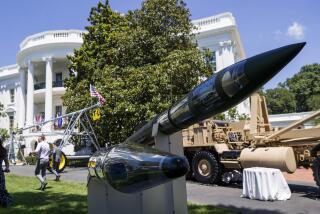Egypt Beefs Up Gulf Force; Won’t Be Battle-Ready for Months, Some Say
- Share via
CAIRO — Egypt is sending more troops to Saudi Arabia, but it will be at least four months before the U.S.-led forces there are ready to fight a full-scale war with Iraq, according to Egyptian military sources.
“A war against Iraq will not be easy,” a source in the military intelligence establishment said. “We must be well prepared. Four months is the minimum it will take for our strength to be at a level where we can be confident of dealing with the Iraqi forces in Kuwait.”
This is a more conservative estimate of the time needed to confront the Iraqis than that given by U.S. military officials in Saudi Arabia. As early as last week, U.S. officials were telling reporters that the buildup of U.S. forces in the area would be complete in a matter of weeks.
However, the Egyptian military source indicated that planners in Cairo are less confident of the reliance their U.S. counterparts seem to be placing on superior technology and air power to compensate for the greater number of Iraqi forces on the ground in Kuwait.
Nearly a month after the start of the U.S. buildup, an estimated 70,000 American military personnel are on the ground in Saudi Arabia, with another 35,000 on Navy ships patrolling the Persian Gulf.
About 5,000 Egyptian soldiers, as well as token forces from other Arab states, have been sent to Saudi Arabia, where they have taken up front-line positions in the eastern desert alongside the Saudi army of 38,000 men.
An Egyptian armored division--about 15,000 men--is about to leave for Saudi Arabia, and a second division may also be sent, according to military and diplomatic sources in Cairo.
The Iraqis, according to the latest estimates available in Cairo, have nearly 20 divisions--about 300,000 men--in or near Kuwait. This is about a third of the Iraqi army.
“This is a huge force, and it is digging in to strong defensive positions” along the Kuwaiti border with Saudi Arabia, an Egyptian military source said.
“We can compensate for this with superior firepower and better quality (weaponry), but only to a certain extent,” the source said. “We cannot neglect the size of the ground forces we face.”
Superior U.S. air power can be used to bomb strategic targets in Iraq, disrupt Iraqi supply lines and blunt an advance by Iraqi armor. But to dislodge such a large force from heavily fortified defensive positions will require the use of ground troops in numbers much larger than those now deployed in the Saudi desert, the source added.
“We hope to avoid war,” he said, “but we must still prepare for it, and this requires patience because we are not yet ready.”
He said that Egyptian officials are counseling patience in the hope that a diplomatic solution may yet be found and because, from a military standpoint, it is “better to wait four months and then finish this in a week than to start in a week and take four months to finish.”
In the meantime, Egyptian military planners are urging that the trade embargo against Iraq be tightened with an air blockade because of reports that planes from a number of countries are arriving in Baghdad with food and other supplies.
In recent days, shipments of food, medicines and possibly other supplies have arrived in Baghdad by air from Poland and Libya, according to intelligence officials here.
Reports that Iran has agreed to funnel “humanitarian assistance” to Iraq are also deeply disturbing to military planners.
No one wants to be put in the position of publicly advocating the starvation of Iraqi civilians, but some officials say privately that a cutoff of food is essential if the embargo is to have its intended effect of forcing Iraq to withdraw from Kuwait without resorting to war.
“The embargo can be an alternative to war only if it is completely and strictly enforced,” one Egyptian military source said.
Another source, in the Egyptian intelligence establishment, said military planners estimate that the combat effectiveness of Iraqi troops in Kuwait can be reduced by 20% to 40% if the embargo is strictly enforced over the next four months.
But this, he said, will happen only when “Iraqi soldiers at the front start to go hungry and when they realize that their families at home are starving.”
More to Read
Sign up for Essential California
The most important California stories and recommendations in your inbox every morning.
You may occasionally receive promotional content from the Los Angeles Times.













